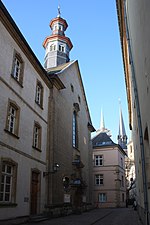Siege of Luxembourg (1794–1795)

The siege of Luxembourg was a siege by France of the Habsburg-held Fortress of Luxembourg that lasted from 1794 until 7 June 1795, during the French Revolutionary Wars. Although the French army failed to breach the walls of the city, which were renowned as amongst the best in the world, the fortress was forced to surrender after more than seven months.Luxembourg's long defence led Lazare Carnot to call Luxembourg "the best [fortress] in the world, except Gibraltar", giving rise to the city's nickname 'the Gibraltar of the North'. The result of the capture of Luxembourg was the annexation of the Southern Netherlands into France on 1 October 1795. Most of Luxembourg (including all of the modern Grand Duchy), became a part of the département of Forêts, which was created on 24 October 1795.
Excerpt from the Wikipedia article Siege of Luxembourg (1794–1795) (License: CC BY-SA 3.0, Authors, Images).Siege of Luxembourg (1794–1795)
Rue Saint-Ulric, Luxembourg Grund
Geographical coordinates (GPS) Address Website Nearby Places Show on map
Geographical coordinates (GPS)
| Latitude | Longitude |
|---|---|
| N 49.611 ° | E 6.133 ° |
Address
Luxembourg City: Old Quarters & Fortifications
Rue Saint-Ulric
2651 Luxembourg, Grund
Luxembourg
Open on Google Maps










